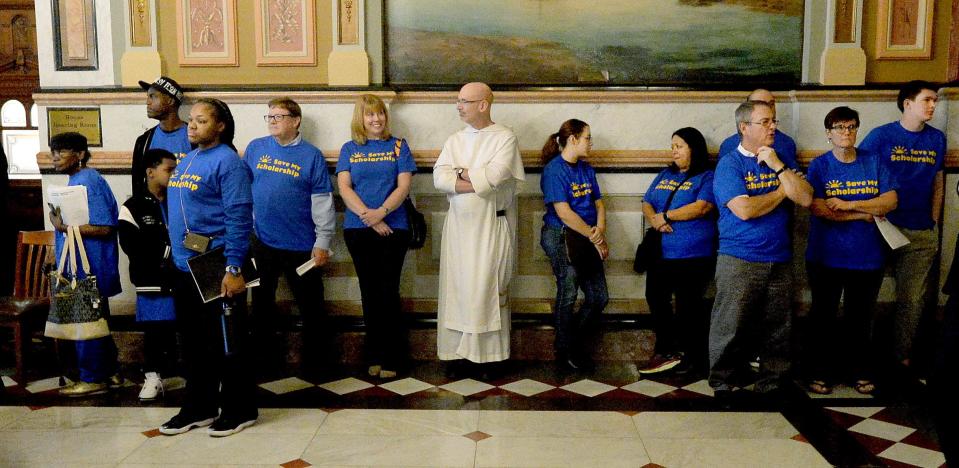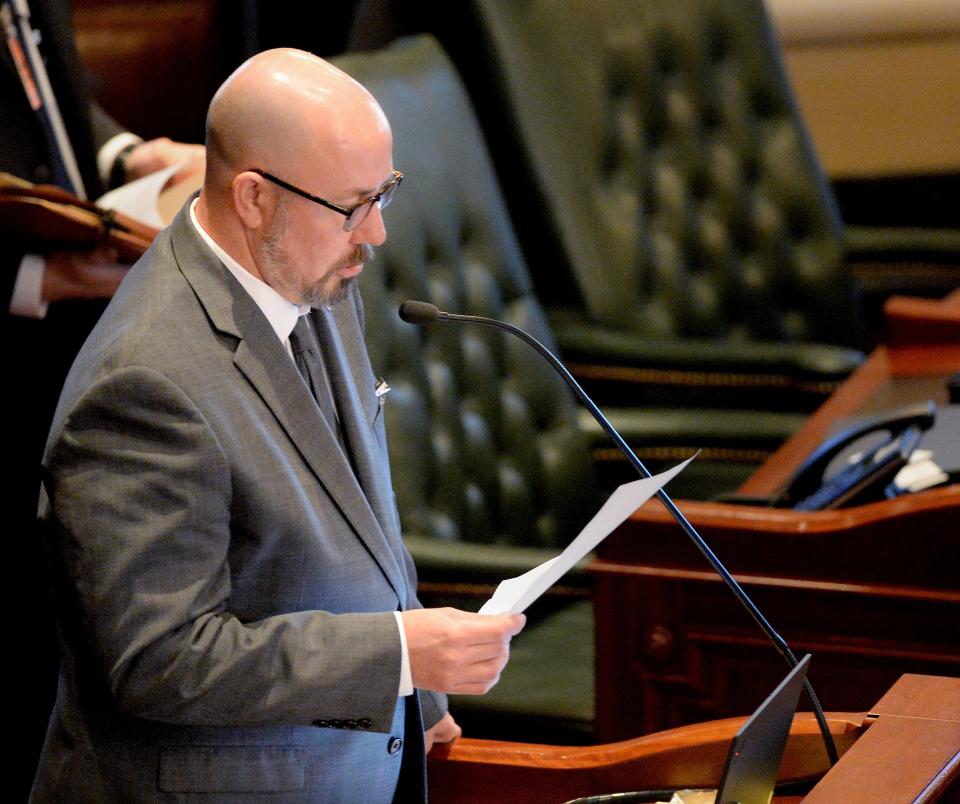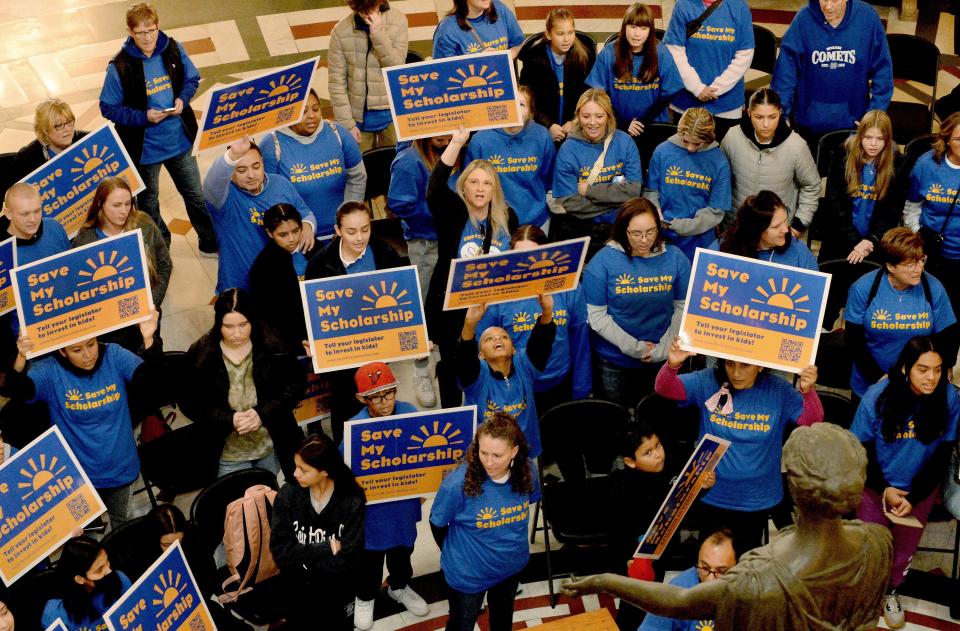Elections in-mind, lawmakers conclude low-thrills veto session
- Oops!Something went wrong.Please try again later.
Lawmakers filed out of Springfield Thursday afternoon, shutting the door on legislative business for the rest of 2023. Compared to past veto sessions, legislative accomplishments were relatively light.
At the outset, the buzz surrounding the session straddling the end of October and start of November centered around renewing a tax credit scholarship program and overriding Gov. JB Pritzker's vetoes. Action on the matters, outside of lifting a 1980s era nuclear moratorium, instead did not happen.
The bills that did pass mostly received bipartisan support and avoided heated debate. It was a drastically different scene than last year's contentious veto session when lawmakers passed amendments to the criminal reform SAFE-T Act.
More: Turner bill amended after property dispute between landowner, District 186 resolved
Many lawmakers will be up for re-election in the 2024 primary, four months from now. Kent Redfield, professor emeritus at the University of Illinois at Springfield, said the lead-up to elections has often kept lawmakers from moving overly controversial legislation to a vote.
"Historically, you do all the heavy lifting in the first year," he said Thursday, recounting the state's passage of the semi-assault weapons ban in January. "Because of the primary structure, you try not to do anything that might cause you primary problems."
Similarly, the legislature could lean into a slower pace when it returns to Springfield on Jan. 16 − less than two months from the March 19 primary.
Inaction on Invest in Kids, Karina's bill
Two heavily lobbied bills in the lead-up to and throughout the six-day veto session never advanced. Perhaps most notable was the decision to not renew Invest in Kids, a program providing income tax credits to those supporting private K-12 school scholarships.
The best chance for action on the program came from a concession bill that would have extended it through 2028 while lowering the maximum annual allocation from the state to $50 million, down from $75 million. That bill was never called and now the program, a 2017 initiative of former Republican Gov. Bruce Rauner, is set to expire on Jan. 1.
More: Local private schools call on legislators to continue tax credit scholarship program
Shouts of "call the bill" from student advocates echoed through the halls of the Capitol throughout the session including Thursday. About 9,500 students statewide would be affected.
Republicans said Democrats had sided with teacher unions, particularly the Chicago Teachers Union, over students. Some Democrats, however, also expressed disappointment with the program's sunset.

"There's no guarantee that they'll be able to stay at the school they may have grown to love and built a community within," said Rep. Kevin Olickal, D-Skokie, on the House floor Thursday, estimating more than 2,000 students in his district will be affected. "They may be thrown into a harmful transition."
The only chance to renew the program before it sunsets would be through a special session, which would require a joint proclamation from Speaker of the House Emanuel "Chris" Welch and Senate President Don Harmon. A spokesperson for Harmon said it was unclear if such a session would be called.
"Sadly, we expected more from our elected state senators, representatives, and governor," the Catholic Conference of Illinois said in a statement. The governor previously signaled he would sign a bill if lawmakers advanced it to his desk. "At the very least, we expected them to represent the opinions of their constituents."
The Save My Scholarship coalition, an advocacy group for the program, said lawmakers would have renewed the program given the chance. It was expected to announce future plans for Invest in Kids on Friday.
Gun and domestic violence prevention advocacy groups had also pushed legislation addressing firearm ownership once a domestic violence order of protection has been filed.
Sen. Celina Villanueva, D-Chicago, and Rep. Maura Hirschauer, D-Batavia, were leading discussions on ‘Karina’s Bill,’ named after Karina Gonzalez was killed despite having a protection order. Her husband was accused in her death. The bill, never advancing out of Senate committee, would've clarified that guns be taken away from an abuser after a judge grants an order of protection.
Questions surrounding enforcement stalled the bill but Villanueva told The State Journal-Register she plans to reintroduce it next session.
Advocates were disappointed by the inaction.
"This is incredibly disappointing to the dozens of domestic violence, gun violence prevention, and legal aid advocacy organizations who joined together to push for this important legislation that would protect the lives of domestic violence survivors here in Illinois," Amanda Pyron, executive director of The Network, a domestic violence prevention organization, said in a statement.
The Senate also did not move a bill allowing for the unionization of legislative staff, a push of Welch's earlier in session. Brady Burden, an analyst with the House Speaker's office, said he was glad it moved through the House but said fellow members of the Illinois Legislative Staff Association wanted to give potentially affected staff time to learn of the bill before pushing it in the Senate.
What did pass?
Responding to an earlier veto by the governor, the House reached concurrence on a revised bill allowing companies to develop new nuclear power generation in Illinois for the first time since 1987.
House Bill 2473 does not entirely lift the 36-year-old moratorium on nuclear construction. Instead, it creates a regulatory structure for the construction of small modular nuclear reactors, or SMRs. The bill passed with bipartisan support in the Senate, 44-7, and the House, 98-8. The opposition came exclusively from Democrats.
The bill limits the nameplate capacity of such reactors to 300 megawatts, about one-third the size of the smallest of six existing nuclear power plants in Illinois. It also requires the state to study rules for regulating SMRs, which will be adopted by regulators at the Illinois Emergency Management Agency by January 2026.

Proponents of the measure such as the Illinois AFL-CIO and Illinois Manufacturers Association say it is a step to make the ongoing transition away from fossil fuels more reliable for customers. Pritzker said in a statement that he would sign the bill.
Sponsors of the legislation, Sen. Sue Rezin, R-Morris, and Rep. Lance Yednock, D-Ottawa, said the bill has the potential to bolster Illinois’ electric reliability as intermittent sources like wind and solar begin to make up a larger portion of the state’s energy output.
“In order to reach our clean energy goals, we may have to invest in more nuclear-generated carbon-free energy,” Yednock said. “The policy does not subtract from the growth of wind and solar energy; it could be an enhancement, as a potential use of small modular reactors could be to energize large manufacturers, therefore keeping more traditional new sources of energy for residential, small commercial customers and our future [electric vehicle] needs.”
The opposition considers SMRs as unproven technology prone to safety risks and cost overruns. Some environmentalists also lined up against the bill worrying that investment in nuclear could take away from investments in renewable energy technology.
Sierra Club Illinois chapter director Jack Darin called nuclear energy “at best, a distraction.” Sierra Club was one of the primary advocacy organizations that sought Pritzker’s veto of the previous bill.
While the Sierra Club remained opposed to the updated version of the bill, the Illinois Environmental Council – which co-signed a letter requesting the August veto with the Sierra Club – adopted a neutral position on the new bill before it was approved on Thursday.
Rep. Lilian Jimenez, D-Chicago, was one of the eight House Democrats who voted against the bill. She said there had not been enough study of the potential drawbacks of SMR development.
“Illinois has plenty of time to assess the risks and costs before opening the door to these projects,” Jimenez said during the floor debate. “I believe we should be focusing on that piece before taking this huge leap and this huge step.”
Because permitting nuclear energy takes many years at the federal level, the earliest a nuclear project could be brought online in Illinois would be in the 2030s.
On Wednesday, the Senate agreed to a bill requiring the state to purchase solely zero-emission vehicles by 2030. Senate Bill 1769 passed 37-18 in the Senate after passing in the House, 69-35, in May. Exemptions are included for law enforcement and vehicles used for a ride-share program administered by the Illinois Department of Transportation.
More: Rebates for electric vehicles again available for Illinois motorists
Bill sponsor Sen. Rachel Ventura, D-Joliet, called the bill an environmental and cost-saving measure.
“This is just one step toward mitigating the impacts of the climate crisis. Illinois continues to lead other states, but there is more work to do,” she said.
The bill was met with opposition from GOP members. Sen. Steve McClure, R-Springfield, said he was worried about not knowing whether, in 2030, the state would have to rely on foreign countries’ battery production capabilities.
“There are plenty of discussions between now and then about how to do this in a responsible way once, hopefully, the United States is more of a battery-producing country,” McClure told his Senate colleagues Wednesday.
Capitol News Illinois contributed to this report.
This story will be updated.
Contact Patrick M. Keck: 312-549-9340, pkeck@gannett.com, twitter.com/@pkeckreporter.

This article originally appeared on State Journal-Register: Lawmakers move to not renew Invest in Kids, do end nuclear moratorium

